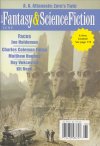 |


|
Gordon Van Gelder: Playing with Protocols |
April 2004 |
|
Gordon Van Gelder grew up in New Jersey, graduating from Princeton in English with an emphasis on Creative Writing. He sold a short story to a 1984 Terry Carr anthology, attended Clarion in 1987, and sold three more stories in the early '90s, but his attention early on was on editing. He worked out of college as editorial assistant at St. Martin's for 12 years, served as an editor for The New York Review of Science Fiction from 1988-1995, and became editor of The Magazine of Fantasy & Science Fiction (F&SF) in 1996. In 2000 he became publisher of F&SF as well, purchasing the business from owner Edward L. Ferman. He's edited several F&SF anthologies, including One Lamp: Alternative History Stories from The Magazine of Fantasy & Science Fiction (2003), with In Lands That Never Were: Swords & Sorcery Stories from the Magazine of Fantasy & Science Fiction due in September 2004. Van Gelder won World Fantasy Awards in 2000 and 2003 in the Special Professional category for editing. He lives in Hoboken, New Jersey, with his wife.
|
|

Photo by Beth Gwinn
Fantasy and Science Fiction
|
Excerpts from the interview:
“People are always predicting the death of short fiction, but there are still too many things you can do with the short story that you can’t do with any other form, so I’m not worried about it. The last two years have been great for anthologies. It does get harder and harder commercially, but it hasn’t been the money for a long time — there are always the small presses. As for the effect of the Internet, a number of people are canceling their subscriptions to the print edition of F&SF and only subscribing to the electronic edition now. That’s fine with me. There will always be a niche for both, at least in my lifetime. I have a cousin who’s 14 and goes to a big public school in the Chicago area. I asked him how many kids carry around Palm Pilots and read off of them, and he said, ‘Only the geekiest.’ Thirty years ago, those were the kids who carried around science fiction paperbacks in their back pockets. So I do think we’ll be seeing more and more publications coming out in electronic format first.
“I don’t know that I would ever accept the magazine appearing only in electronic format. I still believe something of the kinesthetic value is lost if you don’t have a physical object and actually turn pages. There’s something in the process there that goes from the hand to the brain that can’t be measured. Not that the medium is the message, but I think if the written story didn’t work it would be gone by now — film would have supplanted it within the 20th century. It’s also true in the writing process. Look at how many writers still write by hand, and then transcribe it into their computers.”
*
 “There are so many kinds of science fiction now, it’s hard to put them all under one umbrella. You really start to question what it means, and does the center hold? That’s one of the main functions of the magazines, to serve as that center. Years ago, David Hartwell told me that as an editor he used to preach less but as he’s gotten older he’s found it more important to take a strong stand on something. In theory, that’s how it should work; that’s why I’m heading more that way, starting to do more and more of it. Certainly in the back of my mind there are messages I favor more than others. I don’t like complete downers where everything is doomed and there isn’t even one ray of hope, it’s all just going to end in disaster. We don’t need to read that. (On the other hand, I still run a lot of horror. By now it’s a genre with its own conventions, and I like what it’s accomplishing.)”
“There are so many kinds of science fiction now, it’s hard to put them all under one umbrella. You really start to question what it means, and does the center hold? That’s one of the main functions of the magazines, to serve as that center. Years ago, David Hartwell told me that as an editor he used to preach less but as he’s gotten older he’s found it more important to take a strong stand on something. In theory, that’s how it should work; that’s why I’m heading more that way, starting to do more and more of it. Certainly in the back of my mind there are messages I favor more than others. I don’t like complete downers where everything is doomed and there isn’t even one ray of hope, it’s all just going to end in disaster. We don’t need to read that. (On the other hand, I still run a lot of horror. By now it’s a genre with its own conventions, and I like what it’s accomplishing.)”
*
“After Kris Rusch left F&SF in 1996, Ed Ferman contacted me about the job. We had worked together on the Best of F&SF anthologies, and that’s how he knew me. Kris told me Ed believed the ideal age to become editor was about 30, so I fit that bill. Ed was about that age when he started, and Kris was that age when she took over. For one thing, younger people will accept smaller paychecks. And when they’re older they’re not as malleable.
‘‘Leslie Howle was just on my case this morning about my own writing. She actually read what I wrote at Clarion, and she said I could fool other people and get away with this ‘Oh, that’s behind me’ stuff. But when I interviewed with Ed for the job, his first question was basically, ‘Do you want to be a writer?’ and I said, ‘No, there are things I want to write but I don’t want to be a writer. It’s an awful way to make a living. I envy people who can do it and enjoy doing it, but it’s not the life for me.’ Ed sort of breathed a sigh of relief and told me, ‘The main thing I’ve been looking for in an editor is someone who’s not a writer first and an editor second. We did that with Avram Davidson and Kris Rusch, and whenever we do that they eventually get more interested in their own writing and they can’t balance the two.’”
*
 “I hesitate when I’m asked to define the distinctions between genres, because what has always appealed to me about F&SF is that I don’t have to come up with these definitions. I always think of the magazine as being founded on the principle that it doesn’t matter whether it’s fantasy or science fiction, as long as it’s a good story. That’s one of the foundations of the magazine — and it threatens to be its own downfall. That’s exactly the problem I’m describing with all the science fiction that’s indistinguishable from fantasy. For 50 years, we’ve said, ‘It’s more important to be a good story than to define what genre camp you’re in.’ I worry that the effect is getting muted as a result of that. But then I go back on myself. Recently I bought a story that’s basically mainstream but cuts so directly to the heart of what science fiction is all about that I’m running it anyway. It’s all about the possibilities of how science fiction can transcend reality, but the character doesn’t transcend reality.
“I hesitate when I’m asked to define the distinctions between genres, because what has always appealed to me about F&SF is that I don’t have to come up with these definitions. I always think of the magazine as being founded on the principle that it doesn’t matter whether it’s fantasy or science fiction, as long as it’s a good story. That’s one of the foundations of the magazine — and it threatens to be its own downfall. That’s exactly the problem I’m describing with all the science fiction that’s indistinguishable from fantasy. For 50 years, we’ve said, ‘It’s more important to be a good story than to define what genre camp you’re in.’ I worry that the effect is getting muted as a result of that. But then I go back on myself. Recently I bought a story that’s basically mainstream but cuts so directly to the heart of what science fiction is all about that I’m running it anyway. It’s all about the possibilities of how science fiction can transcend reality, but the character doesn’t transcend reality.
‘‘Science fiction will never be accepted fully by the mainstream and it shouldn’t be, because if it is, it’s doing something wrong. In commercial fiction, most of what the books are doing is reinforcing your worldview. Science fiction has at its core the scientific process, which is in itself a religion. You have to make a leap of faith in believing that you can understand everything. That core assumption is what defines science fiction now, more than a lot of the space ships, time travel — things that we call the trappings. It is that approach to problem solving, that sense of being able to apply scientific methods and not coming out with the reassurance that everything is the way it has always been or that order will be reestablished. Science fiction can let anything loose on the world, and it’s a completely different world by the end of it. There isn’t that comfortable reassurance. That has always scared off a lot of readers.”
The full interview, with biographical profile, is published in the
April 2004 issue of Locus Magazine.
You may purchase this issue for $7.95 by sending a check to Locus, PO Box 13305, Oakland CA 94661; or via credit card submitted by mail, e-mail, or phone at (510) 339-9198. (Or, Subscribe.)
|
 |

